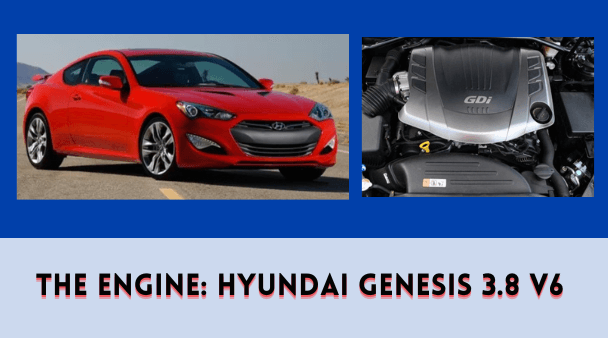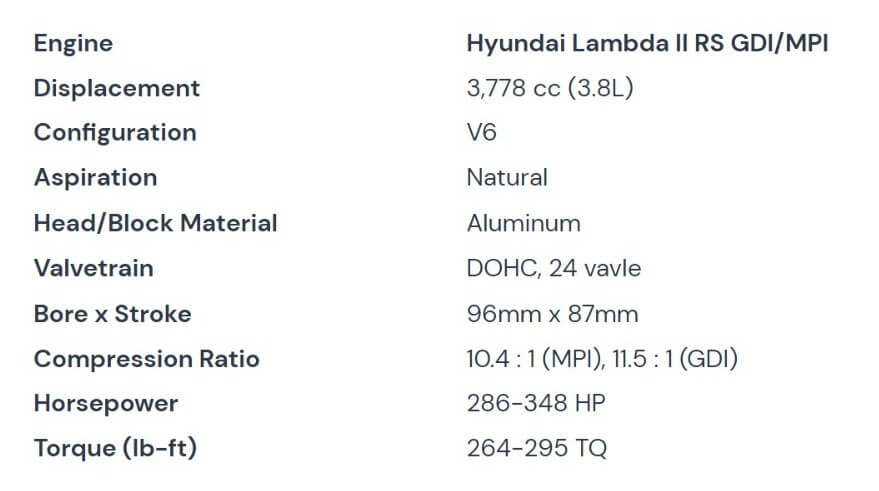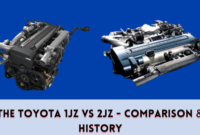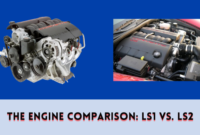The Engine: Hyundai Genesis 3.8 V6. The Hyundai 3.8 Lambda II RS MPi engine first appeared in the Genesis and Genesis Coupe in 2009. Hyundai debuted the Lambda II GDI version in 2012. The 3.8L V6 produces 286-348 horsepower and 264-295 lb-ft of torque. It’s also a fuel-efficient engine with a high level of dependability. However, no engine is perfect, and no exceptions apply here. This article goes about Hyundai Genesis 3.8 Lambda engine problems, reliability, specifications, and more.

What Vehicles Use the 3.8 GDI and MPI?
It is critical to distinguish between the two principal variations of the Lambda II 3.8L V6 engine. The upgrade to the 3.8 GDI engine is a significant improvement, but it does have one possible drawback: carbon build-up. We’ll go over carbon deposits in greater detail later. For the time being, let’s just go through the two Hyundai Genesis engines.
3.8 MPI Hyundai
MPI engines are the original Lambda II RS engine type. MPI is an abbreviation for multi-point injection. This 3.8 Lambda engine is available in the years and models listed below:
- Hyundai Genesis 2009-2011
- Hyundai Genesis Coupe (2009-2015)
- 2013-2018 Kia K9
Depending on the model, Hyundai MPI engines produce 286-312 horsepower. The Genesis Coupe has slightly more power than the sedan variants.
3.8 GDI Lambda II
The Hyundai 3.8 Lambda II GDI engine comes next, with GDI standing for gasoline direct injection. It uses outstanding fuel injection technology to improve performance and fuel economy. As a result, compression rises to 11.5:1. This model is available in the following Hyundai, Genesis, and Kia models:
- G80 Genesis 2016-2020
- Genesis G90 from 2015 till the present day
- 2012-2015 Hyundai Equus
- Hyundai Genesis 2012-2016
- Hyundai Genesis Coupe (2012-2016)
- Kia K9 (2012-present)
Genesis Coupe versions can produce up to 348 horsepower and 295 pound-feet of torque. Outstanding performance for a NA 3.8L V6 engine. Direct infusion is responsible for much of the power boost. Carbon build-up, on the other hand, is a fault of the 3.8 Lambda GDI engine that we’ll explore later.
Specifications for the Genesis 3.8L V6
The following are the specifications for the 3.8 Lambda II MPI and GDI engines:

The Hyundai 3.8’s core design is shared by both models. Both the MPI and GDI engines are 3.8L V6s with aluminum heads and blocks. They also have the same 96mm x 87mm bore and stroke, as well as the same DOHC 24-valve architecture.
The primary distinction is between port fuel injection and direct injection. The 3.8 Lambda GDI engine’s compression ratio was increased as a result of the adjustment. The modifications allow the GDI in the Genesis Coupe to produce up to 348 horsepower.
Typical Hyundai 3.8 Engine Issues
Among the most prevalent issues with Hyundai Genesis 3.8 MPI & GDI engines are:
- Carbon accumulation
- Oil spills
- Transmission
We will go over the above Genesis engine issues in detail throughout the rest of the post. However, before proceeding, certain housekeeping notes must be included. We call these the most prevalent problems for good cause. This does not imply that they are actually common in the meaning of the definition. Rather, these are some of the most prevalent areas where Hyundai 3.8 faults occur.
Having said that, the 3.8 Lambda II RS engines are generally reliable. However, all cars and engines have flaws. Anyway, we’ll return to Genesis 3.8 dependability near the end of the article.
1) Carbon Build-Up 3.8 Lambda II GDI
The first topic is specific to the newer 3.8L GDI engines. Carbon buildup is a common concern with direct injection. It’s fantastic technology, but carbon buildup is a tiny disadvantage. Oil blow-by is produced by all engines. This oil gets into the intake ports and valves. The MPI engine sprays fuel into the intake ports, while detergents remove any oil deposits.
The Hyundai 3.8 GDI engine, on the other hand, lacks this advantage. There is nothing to wipe away oil deposits because the fuel sprays directly into the cylinders. Oil blow-by adheres to valves and ports over time, resulting in carbon build-up.
True, contemporary GDI engines are considerably better at reducing blow-by and buildup. There is, however, no perfect solution without fuel washing over intake valves and ports. Carbon buildup on Genesis 3.8L V6 engines is expected to be an issue after 100,000 to 120,000 kilometers.
Carbon buildup poses no significant risks to dependability or longevity. However, as deposits build, they start to limit airflow. This can result in a variety of symptoms and drivability difficulties. Although it is not needed, we believe walnut blasting is a good idea every 100,000 miles.
Symptoms of Carbon Build-Up in a Genesis 3.8 GDI
Some signs of carbon buildup on the Hyundai 3.8 Lambda II RS GDI engine include:
- Misfires
- Stuttering / rough idle
- Inadequate performance / power loss
Carbon buildup can create inconsistency in airflow into the cylinders. This can result in misfires, which can create a harsh idle and/or stuttering while accelerating. When carbon buildup becomes significant, overall performance can suffer.
A prominent symptom of 3.8L Lambda carbon build-up is power loss. It is, nevertheless, the most difficult symptom to detect. Deposits form over many years and hundreds of thousands of miles. It can be difficult to discern a progressive loss of power and performance.
Blasting 3.8L V6 GDI Walnut
The most efficient method for eliminating carbon buildup from intake valves is walnut blasting. The intake manifold must be removed as part of the process. A shop-vac is then used to blast walnut medium shells into the intake ports. The procedure of walnut blasting the Hyundai 3.8 V6 engine takes a few hours, and labor will most likely cost between $350-600.
There are also several intake sprays available to aid in the cleaning of intake valves. These sprays may assist prevent the buildup of carbon deposits on the 3.8 GDI Lambda engine if applied frequently. However, once the buildup is considerable, they are rarely an effective remedy.
2) Hyundai 3.8 Engine Oil Leaks
Oil leaks on the Hyundai 3.8L Lambda II engine are a common problem. For a handful of reasons, it’s probably not even fair to call it a true issue. For starters, there are no common design defects that cause the MPI or GDI engines to leak. Two, as cars and combustion engines age and mileage increases, they are prone to oil leaks.
However, a handful of Hyundai/Kia/Genesis 3.8 Lambda engines have experienced problems with oil filter parts. Because of improper filter installation, these oil leaks are usually simple to repair. It’s frequently related to a washer, o-ring, or drain stopper. It’s not a big deal, but it’s always a good idea to check for leaks following an oil change.
Our primary focus is on a few oil leaks, which become increasingly common after 8 years and 100,000 kilometers. Look for leaks in the valve cover gasket, oil pan gasket, and main seal oil. This is not a full list of potential leaks on the Lambda GDI and MPI engines. However, these are the most common sites for leaks as these engines age.
Symptoms of V6 Lambda II RS Oil Leak
Oil leaks on the Hyundai Genesis 3.8L engine might cause the following symptoms:
- Leaks that are visible
- odor of burning oil
- Light cigarette smoke
Visible oil leaks are an absolute dead giveaway. If you notice oil on the ground, the 3.8 V6 most certainly has an oil leak someplace. Examine the oil filter, oil pan, and main seal. The gaskets for the valve covers are located at the top of the Hyundai 3.8 Lambda engine. They may leak oil onto heated components, causing the oil to burn off before it reaches the ground.
As a result, burnt oil odors or mild smoke from the engine compartment are possible indications. Some oil may still escape to the ground, but minor leaks will most likely be burned off first.
Fix for Hyundai 3.8 Oil Leak
The precise cure and repairs for an oil leak are obviously dependent on the source. Fortunately, most oil leaks are caused by inexpensive o-rings, gaskets, seals, and other components. They’re parts that typically cost between $10 and $50 for the 3.8L Lambda II motor. It makes oil leaks a low-cost DIY project.
On oil spills, the hardest aspect to swallow is the labor. Valve cover gasket replacement takes a few hours and costs around $200-400 in labor. However, some parts, such as primary seals, can be difficult to replace, resulting in labor expenses of $500 or more.
Related : The Jeep 4.0-liter Straight-Six Engine
3) Transmission Problems with the Genesis 3.8 V6
Although the transmission is not a genuine engine problem, it is a crucial component of the powertrain. Hyundai introduced their own 8-speed transmission in 2012, along with the 3.8 Lambda GDI engine. Previous Genesis models from 2009 to 2011 had a ZF 6-speed transmission, which is a dependable transmission.
The 2012+ 8-speed, on the other hand, had some early difficulties. As a side note, we’ve simply run out of topics to talk about when it comes to Hyundai 3.8 engine difficulties. The transmission faults are rather modest. The majority of the issues were with early 2012 models, and it’s understandable that there were some kinks to smooth out.
The extended manufacturing warranty is an excellent feature. The majority of early transmission problems happen under warranty, and it appears to be basically a non-issue right now. True, erratic transmission failures still occur, but they are few and far between. Overall, the ZF 6-speed in previous Genesis models and the newer 8-speed are both excellent automatic transmissions.
One criticism is that the factory transmission software isn’t the best. There are transmission tunes available.
3.8 Lambda II 8-Speed AT Issues
The following symptoms suggest that the Hyundai Genesis 8-speed transmission is slipping:
- RPMs that are higher than average
- Uneven shifts
- Slow / hanging shifts
This is not a full list, but it does include some of the more prevalent symptoms. When the transmission slips, the RPMs rise more than they should while accelerating. The Hyundai 8-speed transmission may also shift erratically. Finally, sliding can be indicated by hanging shifts or slow shifts.
Hyundai Genesis 3.8 Reliability
Is the engine of the Hyundai Genesis 3.8 Lambda II MPI and GDI reliable? Yes, we feel these vehicles and engines are more reliable than normal. The Hyundai 3.8L V6 Lambda engines don’t have many severe problems or defects. Carbon buildup is only a small issue on 3.8 GDI engines. However, it is a minor trade-off for direct injection, which delivers excellent performance and efficiency.
Aside from the Hyundai 3.8 issues, we didn’t have much to talk about. As engines reach 8 years and 100,000 miles, oil leaks become increasingly typical. That is true of almost any car. The 8-speed AT with 3.8 GDI engines experienced some troubles as well, but it appears to be a good overall transmission.
Of course, maintenance is critical to the Hyundai 3.8 engine’s dependability. Use high-quality oils, change fluids on schedule, and address issues as they arise. It’s basic maintenance that should be performed on any vehicle. If you do all of this, the Hyundai 3.8 will most likely give excellent reliability for many years to come. There are many more than 150,000 kilometers with minimal problems along the way.






